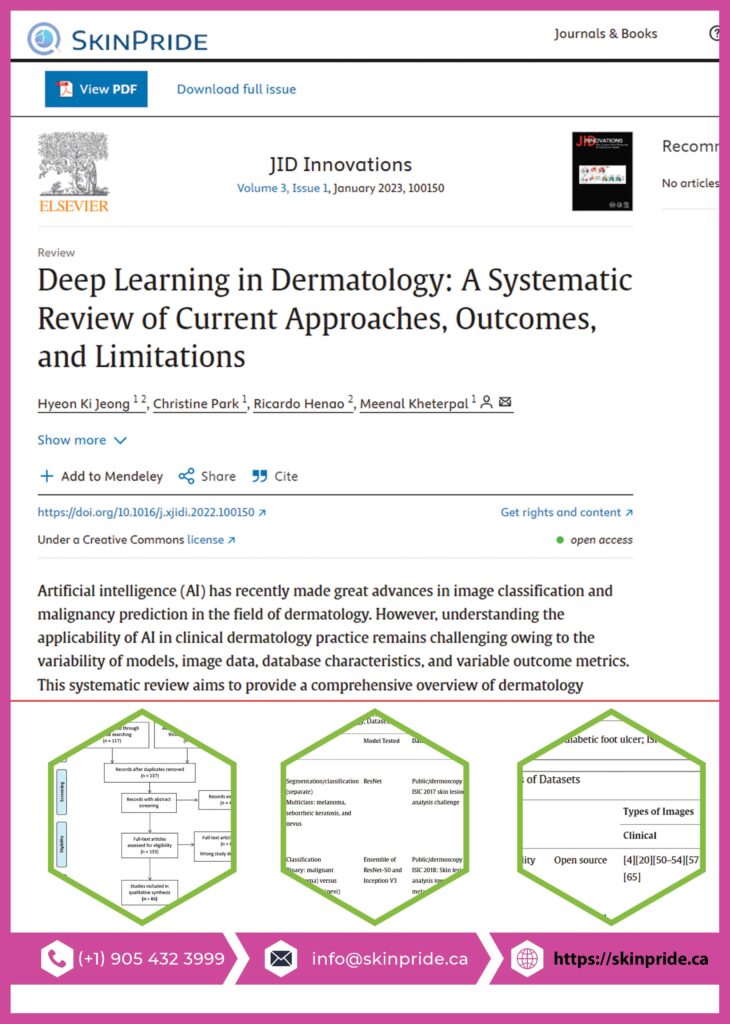The Science of Machine Learning in Skin Analysis
Skin health is a key component of overall well-being, and advancements in technology have made it easier than ever to monitor and analyze skin conditions. Machine learning (ML) and artificial intelligence (AI) have revolutionized dermatology, enhancing our ability to understand, treat, and track changes in the skin over time. With increasing demand for accessible, efficient, and accurate skin care solutions, apps like SkinPride are emerging as essential tools. This article explores how machine learning identifies and monitors skin conditions, its applications in dermatology, and how platforms like SkinPride are leading the way.
Understanding Machine Learning in Skin Analysis
What is Machine Learning in Skin Analysis?
Machine learning refers to algorithms and statistical models that enable computers to improve performance through experience. In skin analysis, these algorithms are trained using large datasets of dermatological images to recognize patterns and predict potential health issues. This technology powers AI tools capable of assessing skin in real time with exceptional accuracy.
How Does Machine Learning Analyze Skin?
By processing skin images, machine learning algorithms identify key features like wrinkles, blemishes, pore size, and pigmentation. The AI system continuously learns and adapts to detect signs of ageing, acne, eczema, and other conditions. As a result, dermatologists can offer more personalized treatments, and users gain access to advanced skin monitoring via their smartphones.
The Role of Data in Skin Analysis
Data is essential for the development and effectiveness of machine learning models. Using large datasets of skin images, AI systems are trained to diagnose various skin conditions. High-quality data improves the accuracy and reliability of these models. As more users contribute their skin data to apps like SkinPride, the system becomes even more refined, enhancing its predictive capabilities.
Applications of Machine Learning in Dermatology
Early Detection of Skin Conditions
One of the greatest advantages of machine learning in dermatology is its ability to detect skin conditions early. AI tools analyze subtle skin changes over time, identifying signs that may be invisible to the naked eye. Early detection plays a crucial role in preventing severe conditions like skin cancer and facilitates timely intervention.
Personalized Skin Care Recommendations
Machine learning not only detects skin conditions but also provides personalized skincare advice. By analyzing factors such as skin type, age, environment, and lifestyle, machine learning systems can recommend tailored products and treatments. This is particularly beneficial for those with sensitive skin or chronic conditions like rosacea or psoriasis.
Monitoring Skin Changes Over Time
Tracking skin health over time is another exciting application of machine learning. Users can monitor how their skin responds to treatments and identify patterns that could signal underlying health issues. Apps like SkinPride allow users to track these changes and receive valuable insights into their overall skin health.
The Science Behind SkinPride and AI-Powered Skin Analysis
AI Technology in SkinPride
The SkinPride app leverages advanced AI algorithms to monitor skin conditions through machine learning. It uses a database of over 10,000 dermatological images to assess a wide range of skin issues, from aging to acne and pigmentation. By uploading photos of their skin, users can receive detailed insights, personalized skincare advice, and track their progress.
Real-Time Skin Analysis and Feedback
With the integration of machine learning, SkinPride offers real-time skin analysis, providing users with immediate feedback on their skin’s condition. The AI system uses image recognition and advanced algorithms to evaluate the skin’s texture, tone, and other critical factors, offering users precise reports on their skin’s health status. This instant analysis allows users to take appropriate action quickly, whether it’s adjusting their skincare routine or consulting a dermatologist.
The Role of AI in Skincare Innovation
Machine learning in skin analysis is not just a technological breakthrough but a game-changer in the skincare industry. With AI tools like SkinPride, skincare routines can become more effective, personalized, and science-driven. The AI system is continually learning and evolving, meaning that users can expect even more accurate and targeted skincare solutions in the future.
SkinPride: Revolutionizing Skincare in Toronto and Beyond
The Rise of AI Skincare in Toronto
In Toronto, one of Canada’s most technologically advanced cities, the demand for AI-powered skincare apps is on the rise. As people become more conscious of their skincare needs, apps like SkinPride are becoming popular tools for both skincare enthusiasts and professionals. These apps offer an accessible, cost-effective alternative to traditional dermatological consultations, especially for people in urban areas who may not have easy access to a dermatologist.
Connecting Users to Dermatological Expertise
By integrating AI with expert dermatological knowledge, SkinPride provides users with the ability to consult with dermatologists remotely. Whether through real-time skin analysis or consultations via the app, users in Toronto and across Canada can now receive professional skincare advice without leaving the comfort of their home.
SkinPride's Expansion to the Global Market
While SkinPride is already gaining popularity in Canada, its success is paving the way for international expansion. As more people around the world embrace AI-driven skin analysis, SkinPride and similar apps are set to revolutionize the skincare industry globally, offering accessible and personalized solutions to users everywhere.
Machine Learning and the Future of Dermatology
Predictive Capabilities and Preventative Measures
Machine learning has the potential to predict future skin issues before they become visible. For example, AI systems can identify early signs of sun damage or aging and recommend preventative measures. This predictive capability is transforming the way people approach skincare, emphasizing prevention over treatment.
The Future of AI in Personalized Dermatology
As AI systems become more sophisticated, personalized dermatology will evolve into an even more tailored experience. With machine learning continuously improving, future applications could provide users with hyper-personalized skincare routines, continuously adapting to the skin’s evolving needs and environmental changes.
Challenges and Limitations of AI in Skin Analysis
Data Privacy and Security Concerns
AI offers many benefits, but data privacy remains a significant concern. Users upload personal skin images to apps like SkinPride, so securing their data is crucial. Developers must ensure both the confidentiality and security of this sensitive information to comply with privacy regulations and maintain trust.
The Need for Human Expertise
Although machine learning can analyze skin conditions effectively, it cannot replace the expertise of dermatologists. These professionals are still essential for diagnosing and treating serious skin issues. AI should be seen as a tool to enhance, not replace, their work.
Limitations of Machine Learning in Dermatology
Machine learning has made significant strides, but it still faces limitations. The system depends on vast amounts of data to learn, which means it may struggle with rare or atypical skin conditions. Moreover, continuous updates are required to keep AI systems effective as skin-related issues evolve over time.

The article emphasizes the transformative role of artificial intelligence and deep learning in dermatology, with AI-powered tools showing significant promise in improving diagnostic accuracy, early detection of skin cancer, and creating personalized treatment plans. However, it also highlights the challenges, such as data privacy concerns, the need for extensive high-quality datasets, and the ongoing need for human expertise in the diagnosis and treatment of skin conditions.
Overview of AI in Dermatology:
The article provides a comprehensive review of the growing role of artificial intelligence (AI) and deep learning in dermatology, particularly for diagnosing and treating skin conditions.
AI's Role in Early Detection:
AI and deep learning algorithms have shown promise in the early detection of skin diseases, such as melanoma and basal cell carcinoma. These systems can analyze skin images to identify suspicious lesions and provide diagnoses that aid dermatologists in clinical decision-making.
Deep Learning in Skin Cancer Detection:
One of the key applications of AI in dermatology is skin cancer detection, where deep learning techniques, including convolutional neural networks (CNNs), are employed to classify various types of skin cancer with high accuracy.
Improvement in Diagnostic Accuracy:
The use of AI tools has been proven to improve the diagnostic accuracy of dermatologists. AI models trained on large datasets of annotated skin images help reduce human error and can provide a second opinion for dermatologists.
AI for Personalized Treatment Plans:
AI algorithms are being utilized to design personalized treatment plans for patients with chronic dermatological conditions such as psoriasis or eczema, based on individual skin types and responses to treatments.
Challenges and Limitations:
Despite its successes, AI in dermatology faces several challenges, including data privacy concerns, the need for large, high-quality annotated datasets, and the potential for misdiagnosis in rare skin conditions.
AI in Skin Imaging:
Skin imaging technologies, such as dermoscopy and optical coherence tomography (OCT), combined with AI, enhance the accuracy of detecting and monitoring skin conditions. These methods allow for non-invasive and detailed visualization of skin layers.
Future Directions:
The article highlights the potential for AI to revolutionize dermatology, focusing on expanding its application to various skin diseases, improving its accuracy, and integrating it with mobile apps for real-time skin monitoring and treatment recommendations.
Collaboration with Dermatologists:
AI is viewed as a tool that can augment, rather than replace, dermatologists. Collaboration between human expertise and AI is emphasized as crucial for improving patient outcomes.
SkinPride is a revolutionary app that allows users to monitor their skin health with AI-powered tools, providing personalized recommendations and real-time skin condition tracking. Unlike traditional AI models in dermatology, which primarily serve clinical environments, SkinPride is designed for individuals who want to actively manage their skin health daily. By simply uploading skin images, users can receive insights into their skin’s condition and improvement recommendations.
Traditional AI tools discussed in dermatology often focus on improving diagnostic accuracy in clinical settings. However, SkinPride enhances the user’s ability to self-monitor and track skin changes over time. The app not only helps with the early detection of skin issues but also empowers users to take preventative measures in a more accessible and affordable manner.
With SkinPride, users are encouraged to engage in preventive care, which is more practical for daily skin health management. Unlike AI in dermatology, which often assists professionals, this app offers direct interaction with users, enabling them to understand their skin’s needs more effectively.
In conclusion, SkinPride offers a more personalized and convenient approach to skin care, making it a better choice for those looking to manage their skin independently. Traditional AI tools, while useful in clinical environments, do not provide the same level of user engagement and accessibility that SkinPride offers.
Conclusion
Machine learning and AI are transforming the way we approach skin health and dermatology. Through innovative apps like SkinPride, users can now receive personalized skincare analysis and recommendations that were once reserved for professional dermatologists. As these technologies continue to evolve, the future of skincare looks brighter and more accessible than ever.
Frequently Asked Questions (FAQ)
AI is becoming increasingly accurate in skin analysis, but it still requires continuous learning from large datasets. Regular updates and improvements help ensure better accuracy over time.
Yes, AI-powered apps like SkinPride use advanced algorithms and dermatological expertise to offer reliable skincare advice. However, for serious conditions, it’s always recommended to consult with a dermatologist.
Yes, SkinPride offers personalized skincare recommendations based on the analysis of your skin’s unique features, such as skin type and condition.
Machine learning algorithms analyze images of skin lesions, identifying patterns that may indicate the early stages of skin cancer, helping to catch it before it becomes more serious.
Most reputable AI skincare apps, like SkinPride, prioritize user data privacy and comply with regulations to ensure data security.

